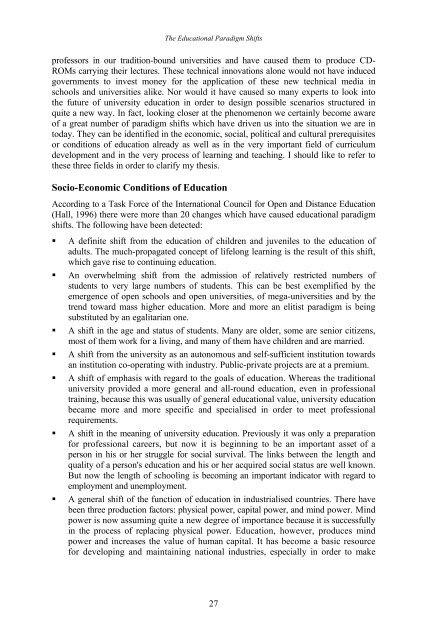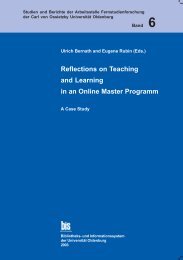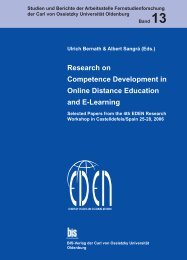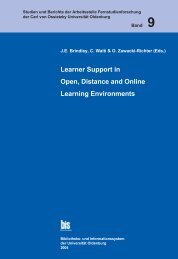Distance Education in Transition - Master of Distance Education ...
Distance Education in Transition - Master of Distance Education ...
Distance Education in Transition - Master of Distance Education ...
You also want an ePaper? Increase the reach of your titles
YUMPU automatically turns print PDFs into web optimized ePapers that Google loves.
The <strong>Education</strong>al Paradigm Shifts<br />
pr<strong>of</strong>essors <strong>in</strong> our tradition-bound universities and have caused them to produce CD-<br />
ROMs carry<strong>in</strong>g their lectures. These technical <strong>in</strong>novations alone would not have <strong>in</strong>duced<br />
governments to <strong>in</strong>vest money for the application <strong>of</strong> these new technical media <strong>in</strong><br />
schools and universities alike. Nor would it have caused so many experts to look <strong>in</strong>to<br />
the future <strong>of</strong> university education <strong>in</strong> order to design possible scenarios structured <strong>in</strong><br />
quite a new way. In fact, look<strong>in</strong>g closer at the phenomenon we certa<strong>in</strong>ly become aware<br />
<strong>of</strong> a great number <strong>of</strong> paradigm shifts which have driven us <strong>in</strong>to the situation we are <strong>in</strong><br />
today. They can be identified <strong>in</strong> the economic, social, political and cultural prerequisites<br />
or conditions <strong>of</strong> education already as well as <strong>in</strong> the very important field <strong>of</strong> curriculum<br />
development and <strong>in</strong> the very process <strong>of</strong> learn<strong>in</strong>g and teach<strong>in</strong>g. I should like to refer to<br />
these three fields <strong>in</strong> order to clarify my thesis.<br />
Socio-Economic Conditions <strong>of</strong> <strong>Education</strong><br />
Accord<strong>in</strong>g to a Task Force <strong>of</strong> the International Council for Open and <strong>Distance</strong> <strong>Education</strong><br />
(Hall, 1996) there were more than 20 changes which have caused educational paradigm<br />
shifts. The follow<strong>in</strong>g have been detected:<br />
� A def<strong>in</strong>ite shift from the education <strong>of</strong> children and juveniles to the education <strong>of</strong><br />
adults. The much-propagated concept <strong>of</strong> lifelong learn<strong>in</strong>g is the result <strong>of</strong> this shift,<br />
which gave rise to cont<strong>in</strong>u<strong>in</strong>g education.<br />
� An overwhelm<strong>in</strong>g shift from the admission <strong>of</strong> relatively restricted numbers <strong>of</strong><br />
students to very large numbers <strong>of</strong> students. This can be best exemplified by the<br />
emergence <strong>of</strong> open schools and open universities, <strong>of</strong> mega-universities and by the<br />
trend toward mass higher education. More and more an elitist paradigm is be<strong>in</strong>g<br />
substituted by an egalitarian one.<br />
� A shift <strong>in</strong> the age and status <strong>of</strong> students. Many are older, some are senior citizens,<br />
most <strong>of</strong> them work for a liv<strong>in</strong>g, and many <strong>of</strong> them have children and are married.<br />
� A shift from the university as an autonomous and self-sufficient <strong>in</strong>stitution towards<br />
an <strong>in</strong>stitution co-operat<strong>in</strong>g with <strong>in</strong>dustry. Public-private projects are at a premium.<br />
� A shift <strong>of</strong> emphasis with regard to the goals <strong>of</strong> education. Whereas the traditional<br />
university provided a more general and all-round education, even <strong>in</strong> pr<strong>of</strong>essional<br />
tra<strong>in</strong><strong>in</strong>g, because this was usually <strong>of</strong> general educational value, university education<br />
became more and more specific and specialised <strong>in</strong> order to meet pr<strong>of</strong>essional<br />
requirements.<br />
� A shift <strong>in</strong> the mean<strong>in</strong>g <strong>of</strong> university education. Previously it was only a preparation<br />
for pr<strong>of</strong>essional careers, but now it is beg<strong>in</strong>n<strong>in</strong>g to be an important asset <strong>of</strong> a<br />
person <strong>in</strong> his or her struggle for social survival. The l<strong>in</strong>ks between the length and<br />
quality <strong>of</strong> a person's education and his or her acquired social status are well known.<br />
But now the length <strong>of</strong> school<strong>in</strong>g is becom<strong>in</strong>g an important <strong>in</strong>dicator with regard to<br />
employment and unemployment.<br />
� A general shift <strong>of</strong> the function <strong>of</strong> education <strong>in</strong> <strong>in</strong>dustrialised countries. There have<br />
been three production factors: physical power, capital power, and m<strong>in</strong>d power. M<strong>in</strong>d<br />
power is now assum<strong>in</strong>g quite a new degree <strong>of</strong> importance because it is successfully<br />
<strong>in</strong> the process <strong>of</strong> replac<strong>in</strong>g physical power. <strong>Education</strong>, however, produces m<strong>in</strong>d<br />
power and <strong>in</strong>creases the value <strong>of</strong> human capital. It has become a basic resource<br />
for develop<strong>in</strong>g and ma<strong>in</strong>ta<strong>in</strong><strong>in</strong>g national <strong>in</strong>dustries, especially <strong>in</strong> order to make<br />
27





